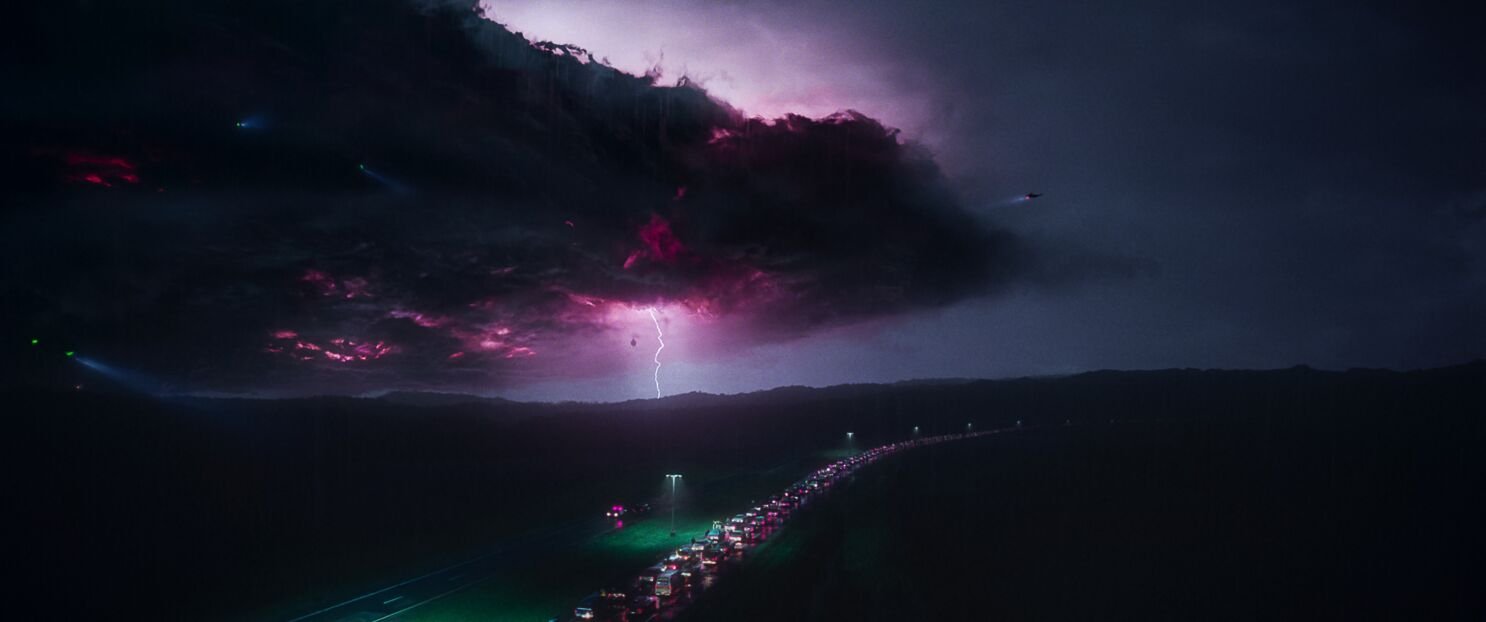WHITE NOISE
Directing: B+
Acting: B+
Writing: B-
Cinematography: B+
Editing: B+
Special Effects: B+
White Noise is kind of all over the place, so it would be fitting for me to start with the end—not just the end, but the end credits. I don’t want to spoil anything, so I won’t say exactly what it is, but I will say that a sequence that lasts the entirety of the credits, which doesn’t quite match the tone of any of the rest of the movie, might be the most fun five minutes or so I’ve spent at the movies all year. I guess that’s one way to get you to sit through the end of the credits. Although you certainly won’t be reading the credtis.
This is a distinct turn in the career of writer-director Noah Baumbach, who here is adapting live action from another source material for the first time. I find myself wondering if the original novel, by Don DeLillo, had the same liberal sprinkling of humor, which I can only call . . . Baumbachian. White Noise is an odd jumble of genres, split into three parts, the middle of which, about an airborne toxic event, is notably Spielbergian in tone and presentation, with tonal notes of both Close Encounters of the Third Kind and War of the Worlds. It’s like we’re suddenly thrust into a disaster movie, but only for its middle third. It basically goes from dramedy to horror and then back again to dramedy.
And the thing is, although this airborne toxic event is easily the most memorable thing about White Noise, that’s not directly what it’s about. What it is about, exactly, I am struggling to wrap my brain around. I might be tempted to ask the same question of “Why?” that I did Bones and All, except that in this case I was truly hooked on this thing I could not quite understand, and in the end, thoroughly delighted. I suppose marrying horror with drama and comedy is much more my speed than marrying horror with romance.
This is not your typical horror movie either, however. There is something far more existential, thematically, going on with White Noise. Much of it has to do with the human quest to stop fearing death, and how that is perhaps a fool’s errand. That gets to the heart of this film, or at least closer to it, than the disaster on its face.
It doesn’t hurt that it is also frequently quite funny, in ways that only Noah Baumbach can be. There have been times I have found his work self-consciously “quirky,” but that’s never really the vibe here, even though sometimes the humor is subtly absurd. All I can say, I guess, is that this movie speaks to me. I would be delighted to watch it again, and revel in the chance to gain greater insight into its intentions.
Reviews of White Noise have been mixed, and I can see why. Some might see this movie and say, “What the hell are they talking about?” Even I sometimes thought exactly that, but was happy to leave the question unanswered just because of how much I dug its vibe. This is largely thanks to its leads, Adam Driver looking pudgier than ever as a middle-aged scholar of Hitler Studies, and Baumbach mainstay Greta Gerwig as his emotionally struggling wife. It is noted at one point that they are each on their fourth spouse, only one of the four children between them actually produced by the two of them together. The three older kids are incredibly well cast, each of them vital parts of the plot and, as actors, very much up to the task.
Don Cheadle plays a colleague at “College on the Hill,” a man with twin obsessions with car crashes in cinema, and Elvis Presley. They have discussions, and in one case a sort of duet college lecture, that draws parallels between the slavish devotion to Elvis and the slavish devotion to Hitler. It felt like it had real import to the themes of this movie, but I never quite understood it.
There are big tonal shifts, giving White Noise an air of a cross between Steven Spielberg, Richard Linklater, the Coen Brothers, maybe even a dash of Robert Altman with its penchant for overlapping dialogue in group or crowd settings. I happen to love all of these directors, and each of these tones somehow work, so I’m into it. One of the final sequences, the most Coen Brothers-esque, takes place in a Catholic emergency room with surprisingly faithless nuns. I found it hilarious.
What I couldn’t tell you, in the end, is quite how it all fits together. I can only tell you I loved the experience. I wish the same for you.
I kind of wanted the entire movie to be about this.
Overall: B+

